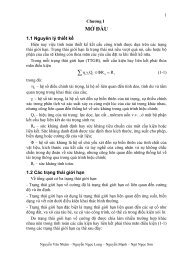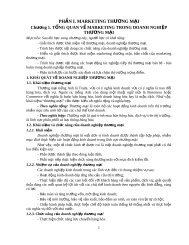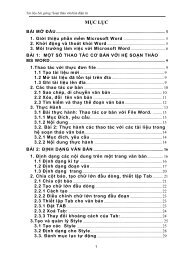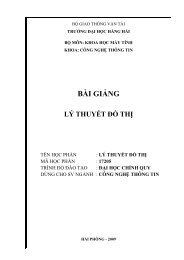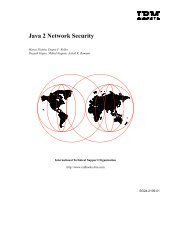- Page 1: TLFeBOOK
- Page 6: HOTEL FRONT OFFICE MANAGEMENTTHIRD
- Page 10: To LindaYour love and encouragement
- Page 16: TLFeBOOK
- Page 20: xPREFACEof terms has been included,
- Page 24: TLFeBOOK
- Page 30: FOUNDERS OF THE HOTEL INDUSTRY 3pro
- Page 34: HISTORICAL DEVELOPMENTS 5Historical
- Page 40: 8 CHAPTER 1: INTRODUCTION TO HOTEL
- Page 44: 10 CHAPTER 1: INTRODUCTION TO HOTEL
- Page 48: 12 CHAPTER 1: INTRODUCTION TO HOTEL
- Page 52: 14 CHAPTER 1: INTRODUCTION TO HOTEL
- Page 56: 16 CHAPTER 1: INTRODUCTION TO HOTEL
- Page 62: BUSINESS AFFILIATIONS 19Business Af
- Page 66: TRENDS THAT FOSTER GROWTH 21great d
- Page 70: TRENDS THAT FOSTER GROWTH 23Family
- Page 74: CAREER DEVELOPMENT 25and other indu
- Page 78: CAREER DEVELOPMENT 27trying to deci
- Page 84: 30 CHAPTER 1: INTRODUCTION TO HOTEL
- Page 90:
C H A P T E R 2Hotel Organization a
- Page 94:
ORGANIZATION CHARTS 35Flexibility i
- Page 98:
TLFeBOOKFigure 2-1. The organizatio
- Page 102:
ORGANIZATION CHARTS 39Figure 2-2. N
- Page 106:
TYPICAL JOB RESPONSIBILITIES OF DEP
- Page 110:
TYPICAL JOB RESPONSIBILITIES OF DEP
- Page 114:
TYPICAL JOB RESPONSIBILITIES OF DEP
- Page 118:
TYPICAL JOB RESPONSIBILITIES OF DEP
- Page 122:
TYPICAL JOB RESPONSIBILITIES OF DEP
- Page 126:
ORGANIZATION OF THE FRONT OFFICE DE
- Page 130:
ORGANIZATION OF THE FRONT OFFICE DE
- Page 134:
FUNCTION OF THE FRONT OFFICE MANAGE
- Page 138:
FUNCTION OF THE FRONT OFFICE MANAGE
- Page 142:
FUNCTION OF THE FRONT OFFICE MANAGE
- Page 146:
CHAPTER RECAP 61vital area to manag
- Page 150:
END OF CHAPTER QUESTIONS 638. Why s
- Page 154:
Table 2-1. Front Office Scheduling
- Page 158:
Table 2-1. (Continued)10/5 10/6 10/
- Page 162:
KEY WORDS 69convention guestscorpor
- Page 166:
C H A P T E R 3Effective Interdepar
- Page 174:
FRONT OFFICE INTERACTION WITH OTHER
- Page 178:
FRONT OFFICE INTERACTION WITH OTHER
- Page 182:
FRONT OFFICE INTERACTION WITH OTHER
- Page 186:
ANALYZING THE LINES OF COMMUNICATIO
- Page 190:
ANALYZING THE LINES OF COMMUNICATIO
- Page 194:
THE ROLE OF TOTAL QUALITY MANAGEMEN
- Page 198:
END OF CHAPTER QUESTIONS 87results
- Page 202:
END OF CHAPTER QUESTIONS 89The serv
- Page 206:
KEY WORDS 91happen. Recently I ran
- Page 210:
C H A P T E R 4Property Management
- Page 214:
PHYSICAL STRUCTURE AND POSITIONING
- Page 218:
SELECTING A PROPERTY MANAGEMENT SYS
- Page 222:
PROCEDURE FOR PERFORMING A NEEDS AN
- Page 226:
PROCEDURE FOR PERFORMING A NEEDS AN
- Page 230:
PROCEDURE FOR PERFORMING A NEEDS AN
- Page 234:
OTHER PMS SELECTION CONSIDERATIONS
- Page 238:
FINANCIAL CONSIDERATIONS 107by comp
- Page 242:
PMS APPLICATIONS 109Figure 4-6. Mai
- Page 246:
PMS APPLICATIONS 111Figure 4-9. Reg
- Page 250:
PMS APPLICATIONS 113or gift shop. S
- Page 254:
PMS APPLICATIONS 115Figure 4-14. Ni
- Page 258:
PMS APPLICATIONS 117Figure 4-17. Ho
- Page 262:
PMS APPLICATIONS 119Figure 4-21. Ma
- Page 266:
CHAPTER RECAP 121Figure 4-24. Time
- Page 270:
SOFTWARE SIMULATION EXERCISE 12312.
- Page 274:
KEY WORDS 125draft-styleE-mailergon
- Page 278:
C H A P T E R 5ReservationsOPENINGD
- Page 282:
OVERVIEW OF THE RESERVATION SYSTEM
- Page 286:
TYPES OF RESERVATION SYSTEMS 131Dis
- Page 290:
SOURCES OF RESERVATIONS 133A toll-f
- Page 294:
SOURCES OF RESERVATIONS 135more rea
- Page 298:
OVERBOOKING (OCCUPANCY MANAGEMENT)
- Page 302:
OVERBOOKING (OCCUPANCY MANAGEMENT)
- Page 306:
YIELD MANAGEMENT 141unpleasant scen
- Page 310:
PROCESSING GUEST RESERVATIONS 143ha
- Page 314:
PROCESSING GUEST RESERVATIONS 145pe
- Page 318:
PROCESS OF COMPLETING RESERVATIONS
- Page 322:
PROCESS OF COMPLETING RESERVATIONS
- Page 326:
PROCESS OF COMPLETING RESERVATIONS
- Page 330:
PROCESS OF COMPLETING RESERVATIONS
- Page 334:
END OF CHAPTER QUESTIONS 155HOSPITA
- Page 338:
END OF CHAPTER QUESTIONS 157CASE ST
- Page 342:
NOTES 159room forecastsstayoverstra
- Page 346:
C H A P T E R 6Yield ManagementOPEN
- Page 350:
OCCUPANCY PERCENTAGE 163Investors a
- Page 354:
USE OF YIELD MANAGEMENT 165at certa
- Page 358:
USE OF YIELD MANAGEMENT 167history
- Page 362:
COMPONENTS OF YIELD MANAGEMENT 169T
- Page 366:
COMPONENTS OF YIELD MANAGEMENT 171o
- Page 370:
COMPONENTS OF YIELD MANAGEMENT 173T
- Page 374:
SOLUTION TO OPENING DILEMMA 175Appl
- Page 378:
END OF CHAPTER QUESTIONS 177FRONTLI
- Page 382:
NOTES 179knows that occupancy perce
- Page 386:
C H A P T E R 7Guest RegistrationOP
- Page 390:
COMPONENTS OF THE REGISTRATION PROC
- Page 394:
COMPONENTS OF THE REGISTRATION PROC
- Page 398:
COMPONENTS OF THE REGISTRATION PROC
- Page 402:
COMPONENTS OF THE REGISTRATION PROC
- Page 406:
COMPONENTS OF THE REGISTRATION PROC
- Page 410:
COMPONENTS OF THE REGISTRATION PROC
- Page 414:
COMPONENTS OF THE REGISTRATION PROC
- Page 418:
COMPONENTS OF THE REGISTRATION PROC
- Page 422:
COMPONENTS OF THE REGISTRATION PROC
- Page 426:
COMPONENTS OF THE REGISTRATION PROC
- Page 430:
COMPONENTS OF THE REGISTRATION PROC
- Page 434:
REGISTRATION WITH A PMS 205Figure 7
- Page 438:
REGISTRATION WITH A PMS 207Figure 7
- Page 442:
REGISTRATION WITH A PMS 209Figure 7
- Page 446:
REGISTRATION WITH A PMS 211Figure 7
- Page 450:
REGISTRATION WITH A PMS 213Figure 7
- Page 454:
SOLUTION TO OPENING DILEMMA 215INTE
- Page 458:
END OF CHAPTER QUESTIONS 21711. Wha
- Page 462:
KEY WORDS 219electronic keyfax mach
- Page 466:
C H A P T E R 8Processing Guest Cha
- Page 470:
ACCOUNT LEDGERS 223Table 8-1. Effec
- Page 474:
ACCOUNT LEDGERS 225Table 8-2. Trans
- Page 478:
POSTING GUEST CHARGES AND PAYMENTS
- Page 482:
POSTING GUEST CHARGES AND PAYMENTS
- Page 486:
TRANSFERRING GUEST AND CITY LEDGERS
- Page 490:
END OF CHAPTER QUESTIONS 233Chapter
- Page 494:
KEY WORDS 235guest wanted an $8.95
- Page 498:
C H A P T E R 9Guest CheckoutOPENIN
- Page 502:
GUEST CHECKOUT PROCEDURE 239Guest C
- Page 506:
GUEST CHECKOUT PROCEDURE 241FRONTLI
- Page 510:
DETERMINING METHOD OF PAYMENT AND C
- Page 514:
DETERMINING METHOD OF PAYMENT AND C
- Page 518:
ASSISTING THE GUEST WITH METHOD OF
- Page 522:
RELAYING GUEST DEPARTURES TO OTHER
- Page 526:
GUEST HISTORIES 251operating proced
- Page 530:
GUEST HISTORIES 253Figure 9-6. Unde
- Page 534:
GUEST HISTORIES 255Figure 9-8. Corp
- Page 538:
END OF CHAPTER QUESTIONS 257End of
- Page 542:
KEY WORDS 259• Correction to a Po
- Page 546:
C H A P T E R 1 0Night AuditOPENING
- Page 550:
THE NIGHT AUDIT PROCESS 263of an ac
- Page 554:
THE NIGHT AUDIT PROCESS 265Assembli
- Page 558:
THE NIGHT AUDIT PROCESS 267Figure 1
- Page 562:
PREPARING THE NIGHT AUDIT REPORT 26
- Page 566:
PREPARING THE NIGHT AUDIT REPORT 27
- Page 570:
PREPARING THE NIGHT AUDIT REPORT 27
- Page 574:
PREPARING THE NIGHT AUDIT REPORT 27
- Page 578:
PREPARING THE NIGHT AUDIT REPORT 27
- Page 582:
PREPARING THE NIGHT AUDIT REPORT 27
- Page 586:
PREPARING THE NIGHT AUDIT REPORT 28
- Page 590:
CHAPTER RECAP 283Figure 10-7. These
- Page 594:
END OF CHAPTER QUESTIONS 285guest c
- Page 598:
END OF CHAPTER QUESTIONS 287Departm
- Page 602:
END OF CHAPTER QUESTIONS 289Figure
- Page 606:
END OF CHAPTER QUESTIONS 291Figure
- Page 610:
END OF CHAPTER QUESTIONS 293Departm
- Page 614:
END OF CHAPTER QUESTIONS 295Figure
- Page 618:
END OF CHAPTER QUESTIONS 297Figure
- Page 622:
END OF CHAPTER QUESTIONS 299Departm
- Page 626:
END OF CHAPTER QUESTIONS 301Figure
- Page 630:
END OF CHAPTER QUESTIONS 303Figure
- Page 634:
C H A P T E R 1 1Managing Hospitali
- Page 638:
IMPORTANCE OF HOSPITALITY 307and se
- Page 642:
MANAGING THE DELIVERY OF HOSPITALIT
- Page 646:
MANAGING THE DELIVERY OF HOSPITALIT
- Page 650:
MANAGING THE DELIVERY OF HOSPITALIT
- Page 654:
DEVELOPING A SERVICE MANAGEMENT PRO
- Page 658:
DEVELOPING A SERVICE MANAGEMENT PRO
- Page 662:
DEVELOPING A SERVICE MANAGEMENT PRO
- Page 666:
DEVELOPING A SERVICE MANAGEMENT PRO
- Page 670:
DEVELOPING A SERVICE MANAGEMENT PRO
- Page 674:
DEVELOPING A SERVICE MANAGEMENT PRO
- Page 678:
DEVELOPING A SERVICE MANAGEMENT PRO
- Page 682:
END OF CHAPTER QUESTIONS 3292. How
- Page 686:
KEY WORDS 3314. Young, “Four Seas
- Page 690:
C H A P T E R 1 2Training for Hospi
- Page 694:
SCREENING FOR HOSPITALITY QUALITIES
- Page 698:
DEVELOPING AN ORIENTATION PROGRAM 3
- Page 702:
DEVELOPING AN ORIENTATION PROGRAM 3
- Page 706:
DEVELOPING A TRAINING PROGRAM 341Fi
- Page 710:
DEVELOPING A TRAINING PROGRAM 343Pr
- Page 714:
STEPS IN THE TRAINING PROCESS 345ac
- Page 718:
STEPS IN THE TRAINING PROCESS 347vi
- Page 722:
ADMINISTERING A TRAINING PROGRAM 34
- Page 726:
TRAINING FOR EMPOWERMENT 351positiv
- Page 730:
AMERICANS WITH DISABILITIES ACT 353
- Page 734:
CHAPTER RECAP 355Solution to Openin
- Page 738:
END OF CHAPTER QUESTIONS 357tion of
- Page 742:
C H A P T E R 1 3Promoting In-House
- Page 746:
THE ROLE OF THE FRONT OFFICE IN MAR
- Page 750:
PLANNING A POINT-OF-SALE FRONT OFFI
- Page 754:
PLANNING A POINT-OF-SALE FRONT OFFI
- Page 758:
THEORIES OF MOTIVATION 367Theories
- Page 762:
TRAINING PROGRAMS FOR A POINT-OF-SA
- Page 766:
FEEDBACK 371FRONTLINE REALITIESfew
- Page 770:
PLANNING A POINT-OF-SALE FRONT OFFI
- Page 774:
CHAPTER RECAP 375Related cost of go
- Page 778:
NOTES 377CASE STUDY 1301The message
- Page 782:
C H A P T E R 1 4SecurityOPENINGDIL
- Page 786:
IMPORTANCE OF A SECURITY DEPARTMENT
- Page 790:
JOB ANALYSIS OF THE DIRECTOR OF SEC
- Page 794:
IN-HOUSE SECURITY DEPARTMENTS VERSU
- Page 798:
ROOM KEY SECURITY 387Figure 14-2. T
- Page 802:
ROOM KEY SECURITY 389tofino Bay Hot
- Page 806:
FIRE SAFETY 391Table 14-1. Maintena
- Page 810:
FIRE SAFETY 393Figure 14-3. Well-ma
- Page 814:
FIRE SAFETY 395Local fire departmen
- Page 818:
EMERGENCY COMMUNICATION 397Years la
- Page 822:
EMERGENCY COMMUNICATION 399Director
- Page 826:
EMPLOYEE SAFETY PROGRAMS 401HOSPITA
- Page 830:
Figure 14-7. Minutes from a safety
- Page 834:
END OF CHAPTER QUESTIONS 405• How
- Page 838:
NOTES 407He thanked her for her con
- Page 842:
Glossaryaccess time: the amount of
- Page 846:
GLOSSARY 411cash bank: a specific a
- Page 850:
GLOSSARY 413demographic data: size,
- Page 854:
GLOSSARY 415food and beverage direc
- Page 858:
GLOSSARY 417ink-jet: a printer that
- Page 862:
GLOSSARY 419motivation: investigati
- Page 866:
GLOSSARY 421predicted house count:
- Page 870:
GLOSSARY 423service strategy statem
- Page 874:
IndexAAccess time, 101Accounting, 1
- Page 878:
INDEX 427Coughlin, Paula, 387CPS (c
- Page 882:
INDEX 429Henderson, Ernest, 4Herzbe
- Page 886:
INDEX 431service incentives, 309-31
- Page 890:
INDEX 433SSafety, employee, 401-404




